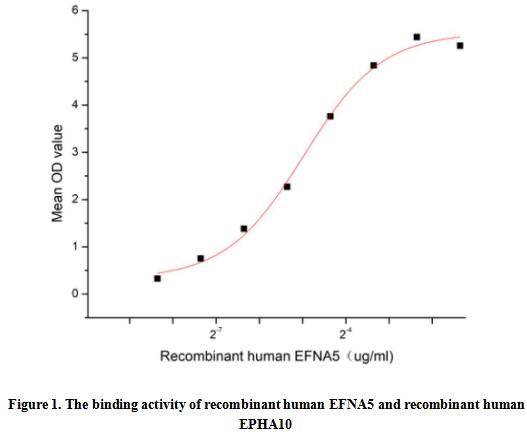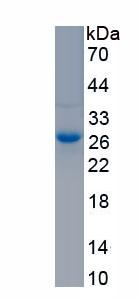Active Ephrin A5 (EFNA5) 

AF1; EFL5; EPLG7; GLC1M; LERK7; RAGS; AL-1; EPH-related receptor tyrosine kinase ligand 7
Overview
Properties
- Product No.APE111Hu01
- Organism SpeciesHomo sapiens (Human) Same name, Different species.
- ApplicationsCell culture; Activity Assays.
Research use only - DownloadInstruction Manual
- CategoryNeuro science
- Buffer FormulationPBS, pH7.4, containing 0.01% SKL, 5% Trehalose.
- Traits Freeze-dried powder, Purity > 90%
- Isoelectric Point6.5
Sign into your account
Share a new citation as an author
Upload your experimental result
Review

Contact us
Please fill in the blank.
Activity test

Ephrin-A5, also known as EFNA5, is a member of the Ephrin family. EFNA5 is localized in cell membranes and was highly expressed in skin, brain, spleen, kidney, heart and fat. EFNA5 can bind to its receptors to play important physiological functions, such as participating in neurogenesis, angiogenesis, promoting cell proliferation and differentiation, balancing glucose homeostasis, maintaining lens development, regulating female mammalian reproduction, and mobilizing fat thermogenesis. EPHA10 is a receptor for members of the ephrin-A family. It binds to EFNA3, EFNA4 and EFNA5. Thus a functional binding ELISA assay was conducted to detect the interaction of recombinant human EFNA5 and recombinant human EPHA10. Briefly, EFNA5 was diluted serially in PBS with 0.01% BSA (pH7.4). Duplicate samples of 100 μl were then transferred to EPHA10-coated microtiter wells and incubated for 1h at 37℃. Wells were washed with PBST and incubated for 1h with anti-EFNA5 pAb, then aspirated and washed 3 times. After incubation with HRP labelled secondary antibody for 1h at 37℃, wells were aspirated and washed 5 times. With the addition of substrate solution, wells were incubated 15-25 minutes at 37℃. Finally, add 50 µL stop solution to the wells and read at 450/630 nm immediately. The binding activity of recombinant human EFNA5 and recombinant human EPHA10 was shown in Figure 1, the EC50 for this effect is 0.03 ug/mL.
Usage
Reconstitute in 10mM PBS (pH7.4) to a concentration of 0.1-1.0 mg/mL. Do not vortex.
Storage
Avoid repeated freeze/thaw cycles. Store at 2-8°C for one month. Aliquot and store at -80°C for 12 months.
Stability
The thermal stability is described by the loss rate. The loss rate was determined by accelerated thermal degradation test, that is, incubate the protein at 37°C for 48h, and no obvious degradation and precipitation were observed. The loss rate is less than 5% within the expiration date under appropriate storage condition.
Increment services
-
 BCA Protein Quantification Kit
BCA Protein Quantification Kit
-
 Molecular Mass Marker for Protein
Molecular Mass Marker for Protein
-
 Monoclonal Antibody Customized Service
Monoclonal Antibody Customized Service
-
 Polyclonal Antibody Customized Service
Polyclonal Antibody Customized Service
-
 Protein Activity Test Experiment Service
Protein Activity Test Experiment Service
-
 Electrophoretic Mobility Shift Assay (EMSA) Experiment Service
Electrophoretic Mobility Shift Assay (EMSA) Experiment Service
-
 Buffer
Buffer
-
 Lentivirus Packaging Experiment Service
Lentivirus Packaging Experiment Service
-
 Adenovirus Packaging Experiment Service
Adenovirus Packaging Experiment Service
-
 Real Time PCR Experimental Service
Real Time PCR Experimental Service
-
 Spike RBD Protein (S-RBD)
Spike RBD Protein (S-RBD)
-
 Protein G
Protein G
-
 Protein A
Protein A







